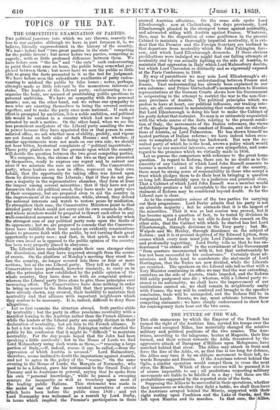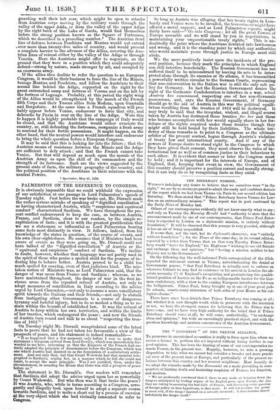THE FUTURE OF THE WAR.
THE able mancenvze by which the Emperor of the French has turned the right of the Austrian line, carried his troops over the Ticino and occupied Milan, has materially changed the relative military and political positions of the two armies. The Aus- trians, according to the telegrams, beaten at Magenta, their line turned, and their retreat towards the Adda threatened by the aggressive attack of Baraguay d'Hilliers upon Melegnano, have marched behind that river. The Allies may attack in front and force the line of the Adda, or, as that line is too long for defence, the Allies may tarn it by an oblique movement to their left, to- wards Bergamo and Brescia. If the Austrians retreat behind the Oglio, a similar operation would compel them to cross the next river, the Mincio. Which of these courses will be pursued it is of course impossible to say ; all predictions respecting military movements are liable to be falsified in a day ; but these are the probabilities suggested by the reported state of the facts. THE able mancenvze by which the Emperor of the French has turned the right of the Austrian line, carried his troops over the Ticino and occupied Milan, has materially changed the relative military and political positions of the two armies. The Aus- trians, according to the telegrams, beaten at Magenta, their line turned, and their retreat towards the Adda threatened by the aggressive attack of Baraguay d'Hilliers upon Melegnano, have marched behind that river. The Allies may attack in front and force the line of the Adda, or, as that line is too long for defence, the Allies may tarn it by an oblique movement to their left, to- wards Bergamo and Brescia. If the Austrians retreat behind the Oglio, a similar operation would compel them to cross the next river, the Mincio. Which of these courses will be pursued it is of course impossible to say ; all predictions respecting military movements are liable to be falsified in a day ; but these are the probabilities suggested by the reported state of the facts.
Supposing the Allies to be successful in their operations, whether they manoeuvre or whether they fight a battle, we shall then have the Austrians arrayed behind the Mincio, supported with their right resting upon Peschiera and the Lake of Garda, And the left upon Mantua and its marshes. In that case, the /Allies,
guarding well their left rear, which might be open to attacks from Austrian corps moving by the military roads through the valley of the upper Adda, or from the valley of the upper Adige by the right bank of the Lake of Garda, would find themselves before the strong position known as the Square of Fortresses, which we described in a preceding number.• The Austrian front line of defence between Peschiera and Mantua would not extend .over more than twenty-five miles of country, and would present a complete barrier to the advance of the Allies, covering the Aus- trian lines of retreat either by the valley of the Adige or through Venetia. Here the Austrians might offer to negociate, on the ground that they were in a position which they could adequately defend—strong by nature, made stronger by art, and occupied by an enormous army.
If the allies then decline to refer the question to an European Congress, it would be their business to force the line of the Mincio, besiege Mantua and Peschiera, and follow the Austrians to their second line behind the Adige, supported on the right by the great entrenched camp and fortress of Verona and on the left by the fortress of Legnago. Probably, at this period the right wing of the Allies would be strengthened by the march of the French fifth Corps and their Tuscan allies from Modena, upon Guastalla and Borgoforte. At the same time a French squadron will pro- bably appear before Venice, endeavour to force that city, and debouche by Pavia in rear on the line of the Adige. Were this to happen it is highly probable that the campaign of Italy would be closed, and that the Austrians would either evacuate the country, or, still defending the fortresses, reorganize a fresh army to contend for their fertile possessions. It might happen, on the other hand, that the neutral powers would interfere and endeavour to bring the whole question before a European Congress. It may be said that this is looking far into the future ; that the Austrian means of resistance between the Minoio and the Adige are sufficient to defy attack ; and that the French cannot take Venice. But that will depend as much upon the morale of the Austrian Army as upon the skill of its commanders and the strength of its fortresses. Such are the views suggested by the present state of facts, the military geography. of the country, and the political position of the Austrians in their relations with the neutral Powers.
* Spectator, May 21,1859.



























 Previous page
Previous page